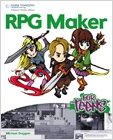The latest addition to our bookshelf is RPG Maker for teens, which was released in the UK last week.

“RPG Maker for teens shows teens and other beginners how to make fun, fantasy role-playing games that they can play and distribute on their computers using the easy-to-learn RPG Maker VX 1.20 program. RPG Maker requires no previous programming experience making it ideal for beginners who want to explore game design techniques and build a basic game design skill set. It also utilizes an anime-style art which is popular with the teen market. The book uses step-by-step lessons and includes tips from game design professionals. Readers will learn how to how to create new art and sound assets to import into the program, how to perfect and enhance their role-playing games, write stories for quests, and more.”
What is RPG Maker?
RPG Maker is the name of a series of programs for the development of role-playing games (RPGs). Most versions include a character creator and a simple scripting language for scripting events. You can sell any game you make with the program, as long as you’ve not used characters that are already copyrighted (e.g. a character from a movie).
What does this have to do with User Assistance and training?
It’s too early to judge whether this book could be relevant to User Assistance, or whether the RPG Maker software could be used to provide a game-based form of Help or training for users. Hopefully, the book will provide the answers to the following questions:
- Could User Assistance be provided via different character archetypes? Would some users learn better from a “guide” and others from a “challenger”, a “librarian” or a “chief”? Which attributes should each helper character have? Should some characters be succinct and others more verbose?
- Could RPG Maker be used to deliver training or Help content in an effective way?
- If RPG Maker is not suitable, could we use it to identify a list of functional requirements for a tool that would be suitable for user assistance?
- Could RPG Maker be used as a prototyping tool – to map out a story, game or training process, which would be then developed in another application?
If anyone has thoughts or experience with this, then we welcome your comments.

I’ve done some thinking (and a tiny smidgeon of work) on this:
http://hypergogue.net/2011/05/27/learning-from-the-future/
I think the key here is in your last point – it’s more about prototyping (at the moment, at least) than anything else. Playing the game would probably be rrrrrubbish. Making the game would be really useful.
Simply defining the character attributes would be a brilliant lens on users.
The thing here is that the secret of games is (deferring to Caillois) that you should be able to say, “I don’t want to play any more.” If you can’t, it’s not a game. So, if you had a load of ‘deep’ information you wanted to encourage users to get their heads round – say, to increase the number of power-users – then the game would be awesome.
But if it was the only choice it’d suck big time.
My work on this has led me to a couple of conclusions:
The amount of text in an RPG is non-trivial. If you take the awesome Echo Bazaar as an example, their game is up to about ‘two novel’s worth’. You’re write to think in terms of a game engine (incidentally, they’re bringing out their own called ‘Vary Tales’ – there are also some freebie CYOA engines that might include multimedia).
Cards are almost certainly the best way to prototype stuff if you’re of a mind to explore this.
Happy to talk about this. Not sure when we’ll get time, though. Maybe a good use case for Google+?
One thought was that the game acts as a table of contents or a find facility to training modules or Help snippets that are located outside of the game.
Google+ – I’m not a member yet (not invited yet)!
Then I shall have to invite you – when they open it up again, which seems to be once a day.
Yep. I think the game as table of contents works well – and it’s a wonderful way to handle progessive disclosure.
I still think it would only be more than a gimmick if it was about helping users turn themselves into power users, though.
Just a thought – could you install one of the comment plug-ins on the blog so people can subscribe to the comments by email? They’re all free and easy to do 🙂
Your wish is my command 🙂